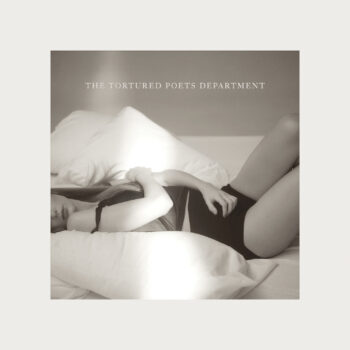Every new Taylor Swift album, since at least ‘folklore,’ has been dissected under the tiniest of microscopes by two kinds of people: the ones who have the capacity to critique without an agenda, and everyone else.
On ‘The Tortured Poets Department,’ the most prolific pop star of the modern era shuts out the noise and, with a collection of 31 songs that range from outstanding to derivative to recycled to competent, continues to do what she does best: tell stories.
‘The Tortured Poets Department’ – Taylor Swift
When Taylor Swift announced the title of her new album, The Tortured Poets Department, at The Grammys earlier this year, this writer had a visceral, in the moment reaction of, “Oh my GOD!! He called her a ‘tortured poet’ didn’t he?? She’s about to go in on him.”
The “him” in this scenario was, of course, Joe Alwyn. Her now ex-boyfriend who she had been linked to for close to (or just over) six years. When announced, the tracklist gave off additional feelings of, “This is going to be a bloodbath.” That was a mistake, as rushing into preconceived notions usually is.

We were then spoon-fed false information that the record was to be somewhat of a cross between Reputation and Red, at least sonically. That was confusing, because Red isn’t exactly what you call an angry breakup album, and Reputation is, quite frankly, a missed opportunity at a true scorched earth moment by Swift in favor of “This is me letting him in to pick up the pieces.” The latter is also looked at as Swift’s “boss queen slay” album by the fans (when THAT album is actually 1989).
In reality, Tortured Poets, in most if not all aspects, is a cross between Midnights, the 1989 (Taylor’s Version) vault tracks, and folklore. There’s a touch of evermore in there as well, but of the two fantasy pandemic-era albums, folklore is very present on this project. This should be a surprise to no one, as this record comes less than a year and a half post-Midnights, her most recent batch of new pop material, and just six months post-1989 (TV). Whether or not those 1989 (TV) vault songs were ACTUALLY written in 2013-14 or not, she chose to release them now because they were all timely and in line with what she was doing outside of her rerecordings.

So, what do we get here? Well, it’s not the funeral of Joe Alwyn.
There are doses of him in this, and the doses are, considering she was with him for six years, intense doses, but she doesn’t dedicate the entire project to tearing him to shreds. She encouraged the fans not to do so as well, even though they already have and continue to. Do they listen? No. That one YouTuber keeps calling him an heirloom turkey.
It is truly a snapshot of her life during the last moments with Alwyn, getting into it with Matty Healy of The 1975 at either the very end of that relationship or almost immediately after, and, quite literally, with “The Alchemy,” nearly present day with Travis Kelce. “Guilty as Sin?” seems to have come within the window of time surrounding Swift’s appearance at The 1975’s show in London in Feb. 2023, performing “Anti-Hero” for the first time as well as a cover of their song “The City.”
“Fresh Out The Slammer” and “Florida!!!” featuring Florence + the Machine, along with “Guilty as Sin,” are a kind of thematic trio. All referencing escaping a toxic environment and feeling both the emotional weight lifting and her general post-breakup horniness. “Florida!!!” is one big metaphor, but she didn’t try and minimize the urgency of what she was feeling. In terms of evocative, mystical storytelling, Swift didn’t stand a chance of coming up with anything remotely close to what Florence was offering, though she did, at the very least, pass the assignment.
That also leads into the issue of songs like “Who’s Afraid of Little Old Me?” Swift does not do ‘cocky,’ ‘aggressive,’ or ‘angry’ very well, and has never done it well. In hindsight, “Look What You Made Me Do” and “End Game” off of Reputation are, to put it bluntly, ridiculous. She tried, but the physicality and the vocal heft just wasn’t there. “mad woman” off of folklore is a much better take on this area for her and she revisits it in that way throughout the Anthology tracks in the second half of this project, but even “The Smallest Man Who Ever Lived,” from the first half, is more refined. It is a skin-curling tirade against Healy who was her fast rebound, but was out as fast as he came into the picture.

Is this her best album? No. Is it her worst album? No. Does she have a best album? Yes. Does she have a worst album? Yes. Many were quick to make snappy, instantaneous judgement calls in regard to its quality, but, now that the dust has settled, it’s safe to say that Tortured Poets is, at least, in the top three best of her catalog, and there are many reasons for that.
Firstly, “But Daddy I Love Him.” This song, a masterstroke of penmanship and pop production, invalidates the argument that she and Jack Antonoff, who has produced a majority of her music since the mid 2010’s, have reached their artistic ceiling as creatives. It is easily the most dynamic of the record, and arguably her best song overall since “my tears ricochet” from folklore. With a runtime of five-and-a-half minutes, both Swift and Antonoff are able to slowly ramp up to heightened crescendos, fall off, then ramp up again on multiple occasions, and still appear to not have exhausted their stamina. It is staggeringly impressive.
Lyrically, it is also the most direct on an album that is VERY direct, messy, and pure word vomit. It’s a final warning shot.
I’ll tell you something right now
I’d rather burn my whole life down
than listen to one more second of all this bitchin and moanin’
I’ll tell you something ‘bout my good name
It’s mine alone to disgrace
I don’t cater to all these vipers dressed in empaths clothing
God save the most judgmental creeps
who say they want what’s best for me
Sanctimoniously performing soliloquies I’ll never see
Thinking it can change the
beat of my heart when she touches me
And counteract the chemistry
And undo the destiny
You ain’t gotta pray for me
Outside of that, which genuinely would have been enough, other highlights include “I Look In People’s Windows,” which, in the middle of the second half, is a much needed complete shift in melody, cadence, key, etc., “thank you aIMee,” a brilliant boygenius/The Highwomen-like song in which the actual musicality is being ignored in favor of its newsworthy-ish cultural element, “So High School,” a genuinely mindless yet charming song about Travis playing the game, no pun intended, in the right way to get her attention (and is also the superior version of “I Can See You” from the Speak Now (TV) vault), “The Prophecy,” which is very Fleetwood, “The Bolter,” which isn’t self-deprecating but an acknowledgment of her rinse/repeat dating cycle, “I Can Do It With A Broken Heart,” the mature and musically-coherent version of “This Is Why We Can’t Have Nice Things” from Reputation that is goofy, but not over the top, “Clara Bow,” which doesn’t fit on the album whatsoever conceptually, but feels like a song that should have existed for a decade now, and “Fortnight” with Post Malone, who, on this occasion, showed a necessary amount of restraint.
Something all of these have in common, which in of itself drives this album way up the ranking of her catalog, is that Swift is really singing on all of them, but she almost never oversings. She has shown vast improvement over the years, and there is not a single section of any of these songs that she can’t perform flawlessly live.
She’s living in her mid-range on “Fortnight,” “Down Bad,” “imgonnagetyouback,” “But Daddy I Love Him,” and “Gulity as Sin.” Her falsetto is stoic and controlled on “So Long, London,” “The Manuscript,” and “Cassandra.” She began exploring this part of her voice on a deeper level on folklore up through her most recent, Midnights, particularly with the 3 a.m. edition tracks. She finally realized she doesn’t have to do what she, quite literally, could not do in “Shake It Off,” “I Knew You Were Trouble,” and any of her early pop hits that took her well out of her comfort zone vocally.

Where she fails to meet the mark, in terms of vocals is, again, “Florida!!!,” as well as “I Hate It Here” and “Robin.” There was no shot of her reaching the heights of which the production was calling for on the latter. She and Antonoff are both to blame for botching “My Boy Always Breaks His Favorite Toys,” which leans too far into the idea of making it sound plastic… robotic. Which is, of course, the point, it just feels like a miss. In fact, it sounds like a companion piece to “All You Had To Do Was Stay” from 1989, which is not compliment.
The very next track, “Down Bad,” is a much tighter, somewhat radio-friendly pop song with less complicated lyrical content and an excellent use of Swift’s blank, deadpan tone on every chorus, excluding when she says “f***.” Then she puts a bit more dirt into it.
Now I’m down bad crying at the gym
Everything comes out teenage petulance
“F* it if I can’t have him…
I might just die, it’ll make no difference.”
Down bad, waking up in blood
Staring at the sky, come back and pick me up
F* it if I can’t have us
I might just get up
I might stay down bad

Mere hours following the release of the record, there was enough “IT’S MID!!” and “Go girl, give us nothing” to go around. Also, a lot of “ENOUGH!! DON’T YOU REST??” “Overexposed” was the main word in that scenario, instead of “strategic” or “calculated,” which Swift has always been. She loves her Easter eggs, after all.
This record is a prime example of how social media has encouraged a demand for reactionary takes. First glance opinions, no time to process. It’s rather distracting, especially when, in the days following a headline or an impassioned first listen blubbering of thought, there is a retread. An “Oh, actually, I was wrong about this.” While this writer has certainly not been immune to this, the goal is to always improve one’s ear. To improve one’s ability to process in real time, or at least, process over a cup of coffee the next morning. To not do so shows an elementary understanding of not just the craft of making music, and art in general, but how we critically assess it.
The Tortured Poets Department is everything a fan could want.
It’s Swift working as the unabashedly prolific songwriter she is, writing in the most abstract, nonsensical, in-the-moment, reflective, melancholic, and cohesive way possible. She lets the listener in, while still managing to keep them at bay. She delivers the bops, the deep cuts that will be dug up five years from now, and the guttural instances of “If I don’t get this off my chest now, I’m going to lose it and, in the process, lose myself to it.”
It is not perfect. It is a sprawling overabundance of content in which Swift is oftentimes unable to generate fresh melodic or musical ideas. However, it is a body of work that displays the focus and precision of a songwriter and artist drawing from her most neoteric emotions and thoughts. For a performer and public figure at the level Swift has attained, that should be enough.
— —
:: stream/purchase The Tortured Poets Department here ::
:: connect with Taylor Swift here ::
– – – –

Connect with Taylor Swift on
Facebook, Instagram, TikTok, Twitter
Discover new music on Atwood Magazine
📸 © Beth Garrabrant
The Tortured Poets Department
an album by Taylor Swift








